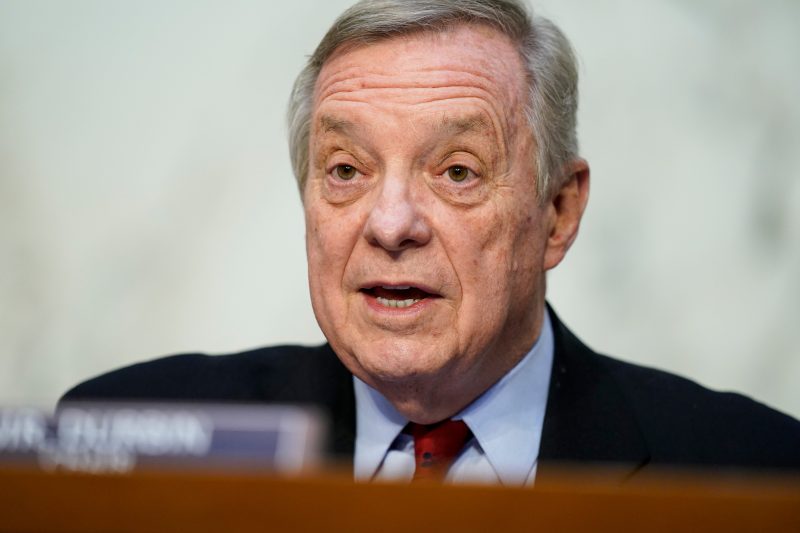
Sen. Durbin invites Roberts to testify on Supreme Court ethics amid Thomas revelations
Senate Judiciary Committee Chairman Richard J. Durbin (D-Ill.) on Thursday invited Chief Justice John G. Roberts Jr. to testify at a public Senate hearing next month on ethics rules governing the Supreme Court as part of what Durbin said is a needed conversation “on ways to restore the Court’s ethical standards.”
Durbin’s request — which would allow Roberts to send a colleague as an alternative — follows recent revelations about a Texas billionaire taking Justice Clarence Thomas on lavish vacations and buying a Georgia home from Thomas and his relatives where the justice’s mother lives. The lack of disclosure has revived concerns about the court’s ability to police its own ethics issues.
Although the justices say they voluntarily comply with the same ethical guidelines that apply to other federal judges, the lack of an ethics code specific to the Supreme Court became a prominent complaint on Capitol Hill predating the latest reports about Thomas.
In his letter, Durbin said Roberts’s “last significant discussion” of how Supreme Court justices address ethical issues was contained in a 2011 report on the federal judiciary.
“Since then, there has been a steady stream of revelations regarding Justices falling short of the ethical standards expected of other federal judges and, indeed, of public servants generally,” Durbin said. “These problems were already apparent back in 2011, and the Court’s decade-long failure to address them has contributed to a crisis of public confidence. The status quo is no longer tenable.”
The hearing is scheduled for May 2.
Roberts did not immediately respond to a request for comment placed through the Supreme Court.
“The opportunity for the American people to hear from Justices in this setting presents a moment that could strengthen faith in our public institutions,” Durbin said in his letter. “The time has come for a new public conversation on ways to restore confidence in the Court’s ethical standards.”
ProPublica revealed this month that Harlan Crow, a prominent Republican donor, has taken Thomas on vacations for two decades and was involved in the Georgia property transaction. Thomas said in a statement that colleagues he did not name told him he did not have to report the vacations and that he has always tried to comply with disclosure guidelines. He has not publicly addressed the property transaction.
The Washington Post has also highlighted other problems with Thomas’s disclosure forms, including reporting that his family received rental income from a Nebraska real estate firm that has not existed since 2006.
Thomas also had reported receiving only two gifts since 2004, according to a Post review of his financial disclosure forms posted online by nonprofit groups Fix the Court and OpenSecrets.
Allegations from congressional Democrats that Thomas probably violated federal ethics laws in his dealings with Crow have been sent to a committee of federal judges responsible for “addressing allegations of errors or omissions in the filing of financial disclosure reports,” a top judicial official said Tuesday.
In his letter, Durbin said there is “ample precedent” for sitting Supreme Court justices to testify before Congress, including about ethics.
He said the committee, for example, heard “robust exchanges about the Court’s approach to ethics matters” from sitting justices in October 2011.
In 2019 testimony, Justice Elena Kagan told a congressional committee that Roberts was “seriously” considering whether the court should have its own ethics code. The Post reported in February that the justices had not reached consensus on such a document, however.
Revised regulations that took effect last month and that apply to all federal judges now require Supreme Court justices to provide a fuller public accounting of free trips, meals, and other gifts they accept from corporations or other organizations.
But congressional critics argue that more aggressive measures are needed. Some Democrats are seeking to use the appropriations process this year to force the court to come up with an enforceable ethics code governing its nine members.
More broadly, Roberts has argued that the judiciary’s independence is best maintained by remaining free of interference from the political branches.
“The Judiciary’s power to manage its internal affairs insulates courts from inappropriate political influence and is crucial to preserving public trust in its work as a separate and co-equal branch of government,” Roberts wrote in a 2021 Year-End Report on the Federal Judiciary.
